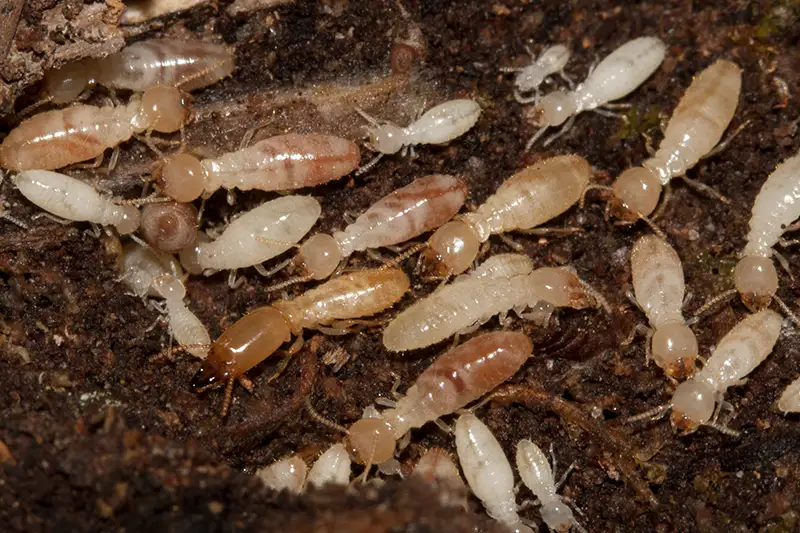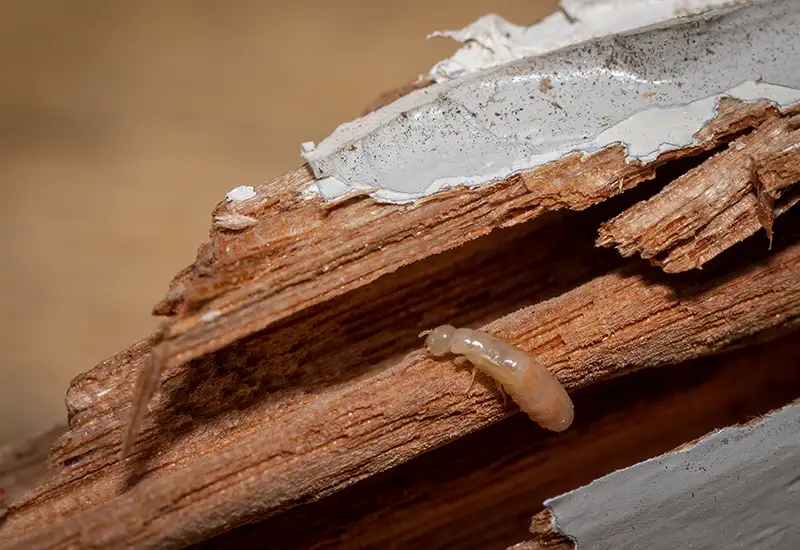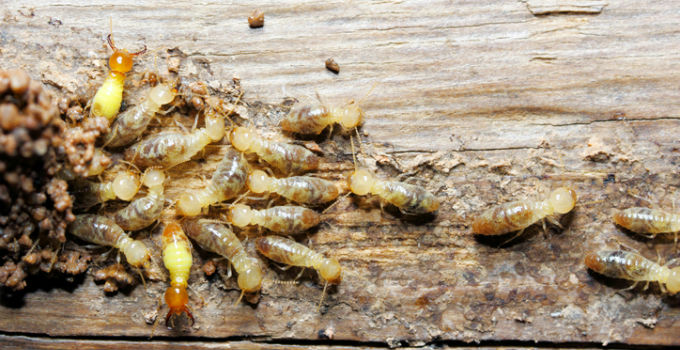Every homeowner in the Keystone State should be on the lookout for termites. The worst-case scenario for homeowners here is structural damage, which can leave you stuck with a pile of bills for extensive repairs and an uninhabitable house.
Termites eat wood and build tunnels to house their colony. The hollowed-out wood (if it’s a part of your home’s foundation), can threaten the integrity of your home’s structural support. A single colony can reach up to 15 million termites and can eat an entire pound of wood a day. Termites are also great hiders, and often, by the time you’ve discovered a termite infestation, your home has probably already suffered significant termite damage.
So what can you do to avoid having termites in your home? Knowing what type of termite is most prevalent in our area, what they’re attracted to, and how to identify possible damage are vital to keeping your home safe.
In this guide to termite infestations, we will explain everything you need to know about termites and how to spot the signs of an active colony.
What Kind of Termites Live in Pennsylvania?
Here in Pennsylvania, the winters are cold and snowy, and the summers are hot and humid. This regular humidity makes it the perfect environment for subterranean termites (Reticulitermes flavipes). There are over 2,000 different species of termite, but only a few varieties are known to cause damage to homes.
These termites require moisture-rich wood, but they’re also among the most damaging. They can construct expansive colonies and ferociously consume wood, which can lead to significant damage quickly.

They’re social pests with three primary castes: the reproductives (queen, king, and secondaries), soldiers, and workers. Kings and queens are dark black or brown and vary between three-eighths to half an inch long. Secondaries are back-up queens, i.e., the supplementary reproductive females appearing in mature colonies if the conditions are favorable.
If your house has a termite infestation, it’s the off-white worker termites building tunnels and colonies, feeding on the wood, and doing most of the damage. Adult workers measure a quarter inch in length, around the same length as an adult soldier termite.
Soldier termites have long yellow heads with huge jaws. A colony has more workers than it does soldiers, and soldiers depend on workers to feed them. Soldiers earn their keep by using their jaws to defend the colony when it is invaded.
Are Termites Active in Winter?
Yes, they can be active in the winter. In the colder months, termites will live farther underground or within the home where the temperatures and moisture levels are comfortable. Termites often burrow up to 40 inches below ground, and they frequently form mud tunnels both inside and outside of any given structure. Mud tubes allow termites to travel while protected from the elements and predators.
Termite infestations can happen in winter as the termites still need to eat and forage for food to feed their colony. Homeowners and business owners may be more aware of termite activity during the warmer months of the year because there are higher moisture levels and colonies swarming. If moisture and food sources exist, termites can survive by building mud tubes within human-made structures.
Termites can be a problem at all months of the year, regardless of how cold your winters are, and the damage they can potentially cause can be substantial over time. Addressing termites in the colder months may require a slightly different approach depending on the structure and infestation, but figuring out how to get rid of termites involves using a blend of methods for the best result.
Protecting your home from termites in winter and year-round involves monitoring the situation, as each infestation is unique. Collecting information about the infestation in your home or business is a necessary step. Liquid treatments, bait, and continued monitoring complete a treatment plan for your structure, and the skilled technicians at Seitz Bros know how to get rid of termites quickly.
What Attracts Termites to My Home (and Where Do They Live)?
You might be surprised to learn that termites play an essential role in our world. They help break down decaying and dying plant material, such as tree stumps. This ability to break things down is what makes them so destructive to homes.
Subterranean termites can be found in moist soil and move to wood near the ground. They accomplish this feat through tubes they construct out of dirt and their own saliva and feces. That means that if your home happens to be in a humid area with regularly moist soil, these termites could infest your home just because of the ground on which it was built. This may not always be the case, though.

Even homes that weren’t built in moist soil are susceptible to termites because they are attracted to moisture in general. Leaky pipes, cracks in the house’s exterior, and poor air circulation can all cause moisture in the home and eventually attract termites.
Termites love hanging out in cellars or basements, which are common spaces in Pennsylvania homes. They seek out structural wood, like studs, joists, subflooring and floors, and mudsills. Any wood that has contact with dirt or rests on the ground is especially accessible. During Pennsylvania’s brutal winters, termites also seek out spaces to keep warm, such as water heaters and pipes or areas around furnaces and chimneys.
Termites usually become active in late winter or early spring, when hordes of the reproductive caste of a termite colony swarm around doors and windows, looking for mates. Once two termites find one another in the chaos, the new couple will look for moist wood with enough space to house a new colony.
How Can I Help Prevent Termite Infestations?
We recommend following these tips:
- Avoid storing firewood, cardboard boxes, and the like in crawl spaces or against foundations. These materials are some of the termites’ favorite snacks, and they can also give termites an open gateway into your home.
- Keep your crawl spaces dry. Termites need wood to be moist to build their colonies.
- Call in professional termite control.
If termites have already made their way into your home, don’t attempt to get rid of them yourself. Trained professionals know how to apply specialized termite treatments that help prevent further damage to your abode.
How Can Seitz Bros Get Rid of Termites?
Termites cause billions of dollars of damage to American homes every year. Don’t be one of the thousands of people dealing with termites in Pennsylvania. If you suspect that you have a termite infestation, don’t hesitate one second longer. The termite specialists at Seitz Bros are experts in identifying and treating termite infestations, and we have different options to fit your needs.
Our methods feature a comprehensive approach, and our experts have experience working in various settings, such as residential homes and commercial buildings.
Call us or fill out the form on our Contact page today to learn more about our services and how we can help prevent or get rid of termites in your home!
A Guide to Termites in PA Pest Control in Pennsylvania & New Jersey
Serving Northeast & Central PA | Lehigh Valley | Pocono Mountains | Western NJ

